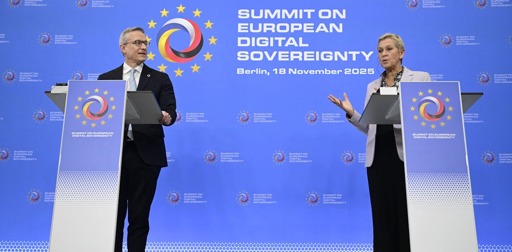cross-posted from: https://mander.xyz/post/42411433
…
Following … Trump’s win [in the US presidential election last year], and amid the first year of the new US administration, members of the European parliament … have swung towards the sovereignty paradigm with a new fervour, embracing an enforcement-focused legal “simplification” agenda that borders on deregulation, and supporting research for funding and policy proposals that would likely have seemed farfetched even two years ago. Ideas for public service media alternatives include an AI-powered “European News Streaming Platform”. And then there’s the EuroStack, an initiative for investment in Europe-based digital infrastructures.
The news platform is still somewhat speculative, but the EuroStack initiative has gained significant traction in Brussels. The EU commissioner for technological sovereignty, Henna Virkunnen, spoke at a EuroStack event in June. Her speech came a little more than six months after a EuroStack pitch document criticised the bloc’s years of US-focused regulation as a misstep that has likely condemned the EU to a future “as a definitive and irreversible ‘US colony’ in digital infrastructure”. Today, as the European Commission “prepares to simplify digital rules with a new omnibus plan”, it appears that EU politicians’ belief in the optimistic, constitutionalist paradigm has significantly deteriorated, if not collapsed.
But old habits die hard, and the EU has for decades been described as a “regulatory state” that effects change primarily through legal rulemaking. It must now resist slipping back into that comfort zone, and also take care, while simplifying the rules, not to destroy the essence of the regulations it has built. If the EU is to offer a genuinely alternative and rights-conscious vision of the internet, it must cast off idealistic visions of achieving hegemony through law and redirect its energies towards technological creation. Initiatives like the Eurostack and the European News Streaming Platform appear to offer promising places to start.
[Edit typo.]
It’s not either or!
Yeah, that’s certainly true. For Europe, however, the continent was rather regulating than building in the past. But it must do both. It’s also important to build a strong open source ecosystem in Europe imho. Relying on European Big Tech (Telecom, SAP, …) is insufficient. I am no sure whether all politicians have gotten this.
Addition: That’s basically what @emotional_soup_88@programming.dev says in this thread. I fully agree with that.
It would also be nice to see the Commission reach out to and making good use of all the talented software engineers that reside in the member states, perhaps even trying to evenly distribute outreach, not just focusing on states that produce economic wealth. It would be even nicer to see the Commission realize the benefits of and invest in open source software and hardware in creating the EuroStack.



